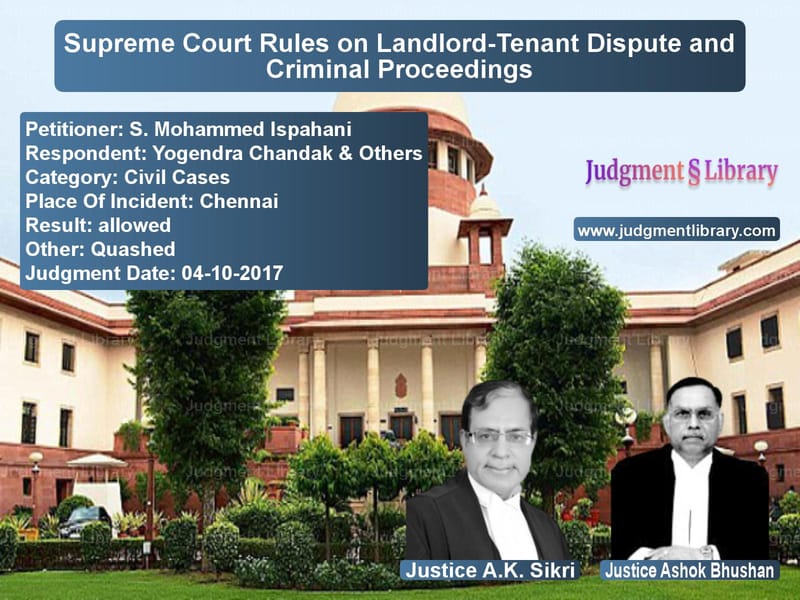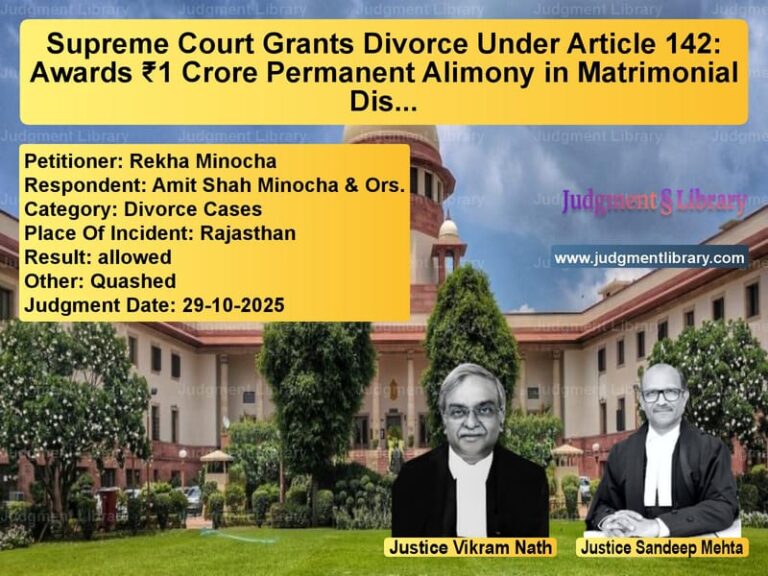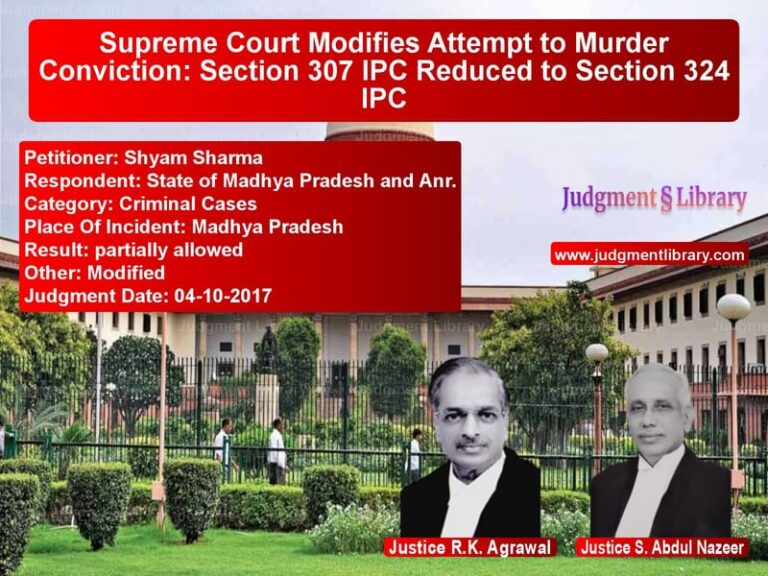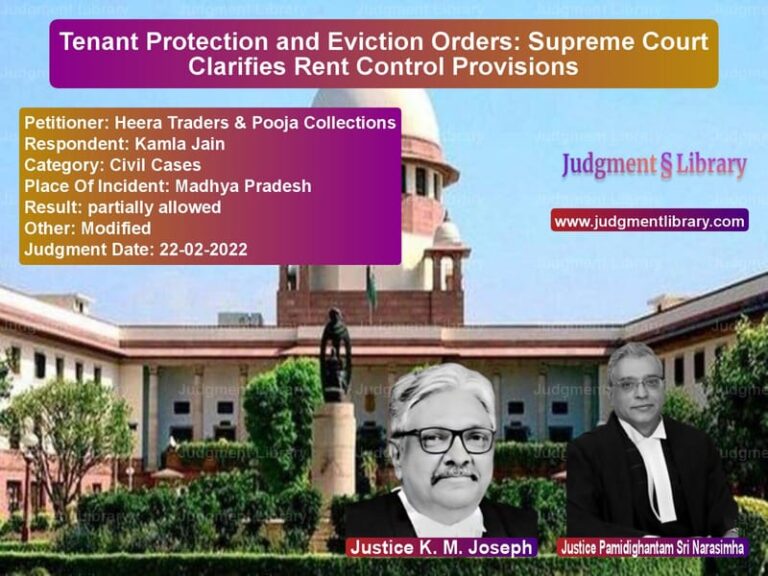Supreme Court Rules on Landlord-Tenant Dispute and Criminal Proceedings
The Supreme Court of India, in its landmark judgment in S. Mohammed Ispahani vs. Yogendra Chandak & Others, clarified legal aspects related to eviction proceedings, criminal allegations against landlords, and the applicability of Section 319 of the Code of Criminal Procedure (CrPC). The ruling sets a significant precedent on the interplay between civil and criminal law in tenancy disputes.
Background of the Case
The case arose from a long-standing tenancy dispute over a commercial property located at Anna Salai, Chennai. The appellant, S. Mohammed Ispahani, along with his family members, were landlords of the disputed property, while the respondent, Girdharilal Chandak, was a tenant.
On February 26, 2007, the landlords obtained an eviction order from the Small Causes Court, Chennai, directing the tenant’s removal from the premises. However, Chandak filed an appeal, which was pending before the appellate court. Importantly, no stay was granted on the eviction order, allowing the landlords to proceed with execution.
On July 24, 2007, the landlords, with the assistance of a court-appointed bailiff, I. Jayaraman, executed the eviction order and took possession of the property. However, Chandak alleged that this eviction was done illegally, involving 50-60 rowdy elements who damaged property, stole valuables, and forcibly removed tenants.
Arguments of the Appellant (Landlords)
The landlords contended:
- The eviction was legally carried out under a valid court order, and no unlawful force was used.
- They obtained warrants of possession and executed them through a court-appointed bailiff.
- The tenant had failed to obtain a stay on the eviction order from the appellate court.
- The allegations of property damage and theft were false and intended to harass them.
- The police investigation had already exonerated them, as their names were not included in the charge sheet.
Arguments of the Respondent (Tenant’s Legal Heir)
The respondent, the son of the original tenant, argued:
- The eviction was executed in an unlawful manner, using hired goons and force.
- The landlords conspired with the bailiff and other individuals to dispossess the tenant without following due process.
- Valuable items, including laptops and antiques, were stolen and later found in the landlords’ possession.
- The landlords should be implicated in the criminal case for their role in orchestrating the alleged illegal eviction.
Supreme Court’s Key Findings
The Supreme Court carefully analyzed the evidence and made several crucial observations:
“The landlords had obtained a valid eviction order and executed it lawfully through a court-appointed bailiff. Allegations of illegal eviction and theft require strong and cogent evidence, which is lacking in this case.”
The Court further noted:
- The eviction was legally executed, and the tenant’s attempts to obtain a stay were unsuccessful.
- The police investigation did not find sufficient evidence to implicate the landlords.
- The charge sheet filed in the criminal case did not name the landlords as accused.
- Prosecution witnesses did not provide direct evidence linking the landlords to any criminal acts.
Final Judgment
The Supreme Court ruled:
- The High Court’s order directing the summoning of the landlords as accused under Section 319 CrPC was quashed.
- The order of the Chief Metropolitan Magistrate refusing to summon the landlords was upheld.
- Criminal proceedings against the landlords were dismissed.
Key Takeaways from the Judgment
This ruling establishes several important legal principles:
- Execution of Eviction Orders: Landlords can lawfully execute eviction orders if tenants fail to obtain a stay.
- Role of Court-Appointed Bailiffs: Bailiffs must follow legal procedures while executing eviction orders.
- Criminal Implications in Eviction Disputes: Allegations of forceful eviction and property damage must be supported by strong evidence.
- Scope of Section 319 CrPC: Courts must ensure that only strong and cogent evidence justifies summoning additional accused.
Impact of the Judgment
The ruling has far-reaching implications for landlords, tenants, and criminal proceedings:
- It reinforces the importance of obtaining stay orders to prevent eviction.
- It ensures that criminal proceedings are not misused to harass landlords executing valid eviction orders.
- It limits the scope of Section 319 CrPC, preventing misuse to implicate individuals without strong evidence.
- It provides clarity on the legal execution of eviction orders and the role of bailiffs.
Conclusion
The Supreme Court’s decision in S. Mohammed Ispahani vs. Yogendra Chandak & Others reinforces the legal framework governing eviction proceedings and criminal allegations in tenancy disputes. By upholding the landlords’ rights and ensuring that criminal law is not misused, the ruling provides a crucial precedent for similar cases in the future.
Don’t miss out on the full details! Download the complete judgment in PDF format below and gain valuable insights instantly!
Download Judgment: S. Mohammed Ispahani vs Yogendra Chandak & O Supreme Court of India Judgment Dated 04-10-2017.pdf
Direct Downlaod Judgment: Direct downlaod this Judgment
See all petitions in Property Disputes
See all petitions in Landlord-Tenant Disputes
See all petitions in Legal Malpractice
See all petitions in Judgment by A.K. Sikri
See all petitions in Judgment by Ashok Bhushan
See all petitions in allowed
See all petitions in Quashed
See all petitions in supreme court of India judgments October 2017
See all petitions in 2017 judgments
See all posts in Civil Cases Category
See all allowed petitions in Civil Cases Category
See all Dismissed petitions in Civil Cases Category
See all partially allowed petitions in Civil Cases Category







